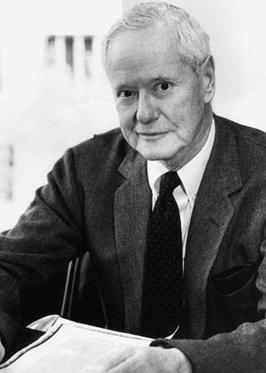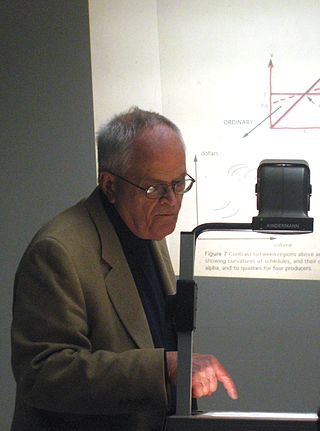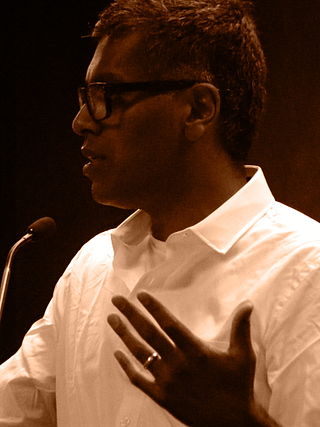
Lambert Adolphe Jacques Quetelet FRSF or FRSE was a Belgian astronomer, mathematician, statistician and sociologist who founded and directed the Brussels Observatory and was influential in introducing statistical methods to the social sciences. His name is sometimes spelled with an accent as Quételet.

Robert King Merton was an American sociologist who is considered a founding father of modern sociology, and a major contributor to the subfield of criminology. He served as the 47th president of the American Sociological Association. He spent most of his career teaching at Columbia University, where he attained the rank of University Professor. In 1994 he was awarded the National Medal of Science for his contributions to the field and for having founded the sociology of science.
Social statistics is the use of statistical measurement systems to study human behavior in a social environment. This can be accomplished through polling a group of people, evaluating a subset of data obtained about a group of people, or by observation and statistical analysis of a set of data that relates to people and their behaviors.
William Julius Wilson is an American sociologist, a professor at Harvard University, and an author of works on urban sociology, race, and class issues. Laureate of the National Medal of Science, he served as the 80th President of the American Sociological Association, was a member of numerous national boards and commissions. He identified the importance of neighborhood effects and demonstrated how limited employment opportunities and weakened institutional resources exacerbated poverty within American inner-city neighborhoods.

Dorothy Edith Smith was a British-born Canadian ethnographer, feminist studies scholar, sociologist, and writer with research interests in a variety of disciplines. These include women's studies, feminist theory, psychology, and educational studies. Smith was also involved in certain subfields of sociology, such as the sociology of knowledge, family studies, and methodology. She founded the sociological sub-disciplines of feminist standpoint theory and institutional ethnography.

Loïc J. D. Wacquant is a French sociologist specializing in urban sociology, urban poverty, racial inequality, the body, social theory and ethnography.
The title of Quetelet Professor is a distinction awarded to professors at Columbia University. It is named after Adolphe Quetelet, the Belgian astronomer, mathematician, statistician, sociologist, and founder of the Royal Observatory of Belgium.

Fieldnotes refer to qualitative notes recorded by scientists or researchers in the course of field research, during or after their observation of a specific organism or phenomenon they are studying. The notes are intended to be read as evidence that gives meaning and aids in the understanding of the phenomenon. Fieldnotes allow researchers to access the subject and record what they observe in an unobtrusive manner.

Harrison Colyar White was an American sociologist who was the Giddings Professor of Sociology at Columbia University. White played an influential role in the “Harvard Revolution” in social networks and the New York School of relational sociology. He is credited with the development of a number of mathematical models of social structure including vacancy chains and blockmodels. He has been a leader of a revolution in sociology that is still in process, using models of social structure that are based on patterns of relations instead of the attributes and attitudes of individuals.

In sociology, social psychology studies the relationship between the individual and society. Although studying many of the same substantive topics as its counterpart in the field of psychology, sociological social psychology places relatively more emphasis on the influence of social structure and culture on individual outcomes, such as personality, behavior, and one's position in social hierarchies. Researchers broadly focus on higher levels of analysis, directing attention mainly to groups and the arrangement of relationships among people. This subfield of sociology is broadly recognized as having three major perspectives: Symbolic interactionism, social structure and personality, and structural social psychology.

Samuel Stebbins Bowles, is an American economist and Professor Emeritus at the University of Massachusetts Amherst, where he continues to teach courses on microeconomics and the theory of institutions. His work belongs to the neo-Marxian tradition of economic thought. However, his perspective on economics is eclectic and draws on various schools of thought, including what he and others refer to as post-Walrasian economics.

Sudhir Alladi Venkatesh is an American sociologist and urban ethnographer. He is William B. Ransford Professor of Sociology & African-American Studies at Columbia University, a position he has held since 1999. In his work, Venkatesh has studied gangs and underground economies, public housing, advertising and technology. As of 2018, he is the Director of Signal: The Tech & Society Lab at Columbia University.
Moving to Opportunity for Fair Housing (MTO) was a randomized social experiment sponsored by the United States Department of Housing and Urban Development (HUD) in the 1990s among 4,600 low-income families with children living in high-poverty public housing projects.

Sociology is the scientific study of human society that focuses on society, human social behavior, patterns of social relationships, social interaction, and aspects of culture associated with everyday life. Regarded as a part of both the social sciences and humanities, sociology uses various methods of empirical investigation and critical analysis to develop a body of knowledge about social order and social change. Sociological subject matter ranges from micro-level analyses of individual interaction and agency to macro-level analyses of social systems and social structure. Applied sociological research may be applied directly to social policy and welfare, whereas theoretical approaches may focus on the understanding of social processes and phenomenological method.

Michèle Lamont is a Canadian sociologist who is the Robert I. Goldman Professor of European Studies and a professor of Sociology and African American Studies at Harvard University. She is a contributor to the study of culture, inequality, racism and anti-racism, the sociology of morality, evaluation and higher education, and the study of cultural and social change. She is the recipient of the Gutenberg Award and the Erasmus award, for her "devoted contribution to social science research into the relationship between knowledge, power, and diversity." She has received honorary degrees from five countries. and been elected to the British Academy, Royal Society of Canada, Chevalier de l’Ordre des Palmes académiques, and the Sociological Research Association. She served as president of the American Sociological Association from 2016 to 2017. In 2024, she was elected to the American Philosophical Society.
Narrative psychology is a perspective in psychology concerned with the "storied nature of human conduct", that is, how human beings deal with experience by observing stories and listening to the stories of others. Operating under the assumption that human activity and experience are filled with "meaning" and stories, rather than lawful formulations, narrative psychology is the study of how human beings construct stories to deal with experiences.
Founded in 1967, Inquilinos Boricuas en Acción (IBA) is a community development corporation whose goal is to make sure the residents of Villa Victoria in South End, Boston keep long term control over their housing and neighborhood. They offer many programs for community development and organization, such as art, culture, and human services for the neighborhood. They hope to empower the growing Latino community in Boston's South End, most notably the Villa Victoria section.
Francine M. Deutsch is an American writer and professor emeritus at the Mount Holyoke College in Massachusetts since 1981. She is a professor of Psychology and Education. She is specialized in the social psychology of gender in everyday life, gender inequality at home and in labour market, and the educational trajectories of pre-school teachers. She worked on the link between unequal earning, young children at home and domestic inequality in household duties.

Jessica McCrory Calarco is an American sociologist and a professor of sociology at the University of Wisconsin–Madison. Her research considers inequalities in education and family life. She has published three books, Negotiating Opportunities, A Field Guide to Grad School, and Qualitative Literacy.
Peter Marsden is an American sociologist. He is the Edith and Benjamin Geisinger Professor of Sociology at Harvard University.










